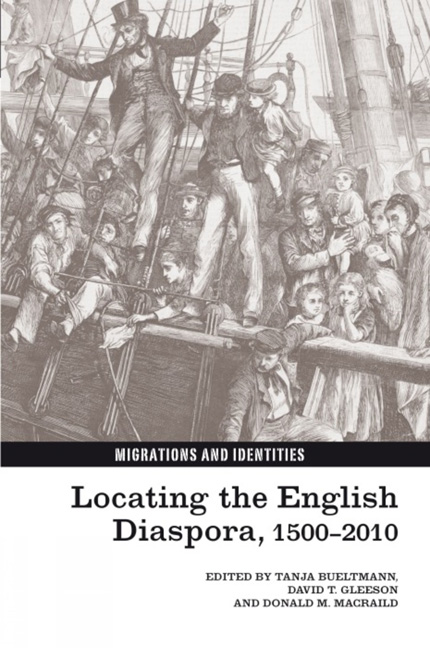Book contents
- Frontmatter
- Contents
- Notes on Contributors
- Introduction. Locating the English Diaspora: Problems, Perspectives and Approaches
- 1 Mythologies of Empire and the Earliest English Diasporas
- 2 The English Seventeenth Century in Colonial America: The Cultural Diaspora of English Republican Ideas
- 3 Fox Hunting and Anglicization in Eighteenth-Century Philadelphia
- 4 The Hidden English Diaspora in Nineteenth-Century America
- 5 An English Institution? The Colonial Church of England in the First Half of the Nineteenth Century
- 6 The Importance of Being English: English Ethnic Culture in Montreal, c.1800–1864
- 7 Anglo-Saxonism and the Racialization of the English Diaspora
- 8 ‘The Englishmen here are much disliked’: Hostility towards English Immigrants in Early Twentieth-Century Toronto
- 9 Cousin Jacks, New Chums and Ten Pound Poms: Locating New Zealand's English Diaspora
- 10 ‘Cooked in true Yorkshire fashion’: Regional Identity and English Associational Life in New Zealand before the First World War
- 11 Englishness and Cricket in South Africa during the Boer War
- 12 An Englishman in New York? Celebrating Shakespeare in America, 1916
- 13 The Disappearance of the English: Why is there no ‘English Diaspora’?
- Index
4 - The Hidden English Diaspora in Nineteenth-Century America
- Frontmatter
- Contents
- Notes on Contributors
- Introduction. Locating the English Diaspora: Problems, Perspectives and Approaches
- 1 Mythologies of Empire and the Earliest English Diasporas
- 2 The English Seventeenth Century in Colonial America: The Cultural Diaspora of English Republican Ideas
- 3 Fox Hunting and Anglicization in Eighteenth-Century Philadelphia
- 4 The Hidden English Diaspora in Nineteenth-Century America
- 5 An English Institution? The Colonial Church of England in the First Half of the Nineteenth Century
- 6 The Importance of Being English: English Ethnic Culture in Montreal, c.1800–1864
- 7 Anglo-Saxonism and the Racialization of the English Diaspora
- 8 ‘The Englishmen here are much disliked’: Hostility towards English Immigrants in Early Twentieth-Century Toronto
- 9 Cousin Jacks, New Chums and Ten Pound Poms: Locating New Zealand's English Diaspora
- 10 ‘Cooked in true Yorkshire fashion’: Regional Identity and English Associational Life in New Zealand before the First World War
- 11 Englishness and Cricket in South Africa during the Boer War
- 12 An Englishman in New York? Celebrating Shakespeare in America, 1916
- 13 The Disappearance of the English: Why is there no ‘English Diaspora’?
- Index
Summary
‘The American is only the continuation of the English genius into new conditions.’ So wrote Ralph Waldo Emerson in 1856. He was not alone in that assessment. Some twenty years earlier, Alexis de Tocqueville had defined Americans as ‘the portion of the English people charged with exploiting the forests of the new world’. Of course, things have changed since then. But for much of the long nineteenth century, what Emerson, Tocqueville and many others said had much truth to it. Early observers took the English foundations of American culture for granted – and for good reason. Because of the long, virtually uninterrupted migration of English (and other British) people to America – and Britain's long rule of the American colonies – English culture ran deep in America. In some ways it still does.
Despite the often bitter war for independence, the tight Anglo-American cultural ties remained, and even grew in some ways. According to the 1790 census, people of English origin or ancestry were by far the largest group, comprising about 60 per cent of the white population, or about half of the population if we include Africans. Meanwhile there was growing American ‘Anglicization’ as whites in search of their identity standardized their culture. Most white Americans, then, had a largely English understanding of their heritage. There were essential differences, of course, but the basic cultural patterns remained. Furthermore, almost immediately after the war, trade and migration resumed and Anglo-American economic ties developed. In fact, American independence transformed the Anglophone people from a single polity into an intercontinental world, and together, Britain and the United States formed an ‘Atlantic economy’ based on the free flow of capital and people. Britain's economic and cultural ties with the United States were now actually closer and more mutually beneficial than those Britain shared with her remaining colonies. The two were the most inter twined sovereign nations in the world – and the ‘Hidden English Diaspora’ was at the centre of this world-shaping development. From 1815 to 1930 at least 12 million Britons permanently settled in North America, Australasia and South Africa (other estimates point to a total of 18.7 million not counting returns). For the English alone in the long nineteenth century, the numbers are close to 10 million – most of them settling in the United States.
- Type
- Chapter
- Information
- Locating the English Diaspora, 1500–2010 , pp. 67 - 83Publisher: Liverpool University PressPrint publication year: 2012



